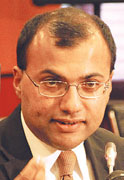Sri Lanka's economy shows much progress - Koshi Mathai
By Gamini Warushamana
Sri Lanka's economy has shown much progress and growth is
satisfactory when taken in the global context, said IMF, resident
reperesentative, Koshi Mathai.Explaining the IMF view of the Sri Lankan
economy after the completion of the Article IV consultative meeting, he
said that the 6.4 percent economic growth rate last year was positive in
the global context. The economic growth rates in 2010 and 2011 were
higher than emerging economies, but there are challenges as well, he
said.
 He stressed that monetory policy should remain unchanged and should
target low inflation. He was responding to recent remarks of government
officials on the possibility of relaxing monitory policy. He stressed that monetory policy should remain unchanged and should
target low inflation. He was responding to recent remarks of government
officials on the possibility of relaxing monitory policy.
“We recommend holding policy rates at current levels, at least until
inflation eases. It is difficult to say how long a tight monetary policy
should be maintained.
The Central Bank will have to respond as the situation develops but
we expect policy rates to remain as it is, for the rest of the year,”
Mathai said.
Last month inflation was low at 6.4. However, an increase can be
expected with the electricity tariff increase. Even though inflation is
in single digits it is still high. Therefore, the target should be low
inflation and not the GDP, he said.
Sri Lanka's current account deficit has improved and it was at a peak
last year. Policy measures have helped to narrow the trade balance.
There is a BOP surplus and we expect further improvement this year. The
external reserve position is strong and there is $ 7 billion in
reserves, sufficient for 3.5 months of imports.There is no discussion
with the CB on another Stand-by Arrangement facility. The IMF is closely
working with the CB and we could start discussions on assistance at any
time. Low Foreign Direct Investment is another challenge. According to
studies, tax is one of the least concerns for FDI and it is not the
primary driver. Improvements in infrastructure and business climate are
more important.
The fiscal deficit is higher than what was targeted and this is also
a challenge. The 6.4 percent budget deficit in 2012 reflects only cash
payments and there are hidden figures. Therefore the actual figure will
be higher. Tax revenue remains low and to increase tax revenue, the tax
base should be widened and tax administration should be improved. As a
result of the high fiscal deficit there is not much space for productive
investments. Sri Lanka's public investments is only six percent, which
is low compared to other countries such as China, Malaysia and India.
|


